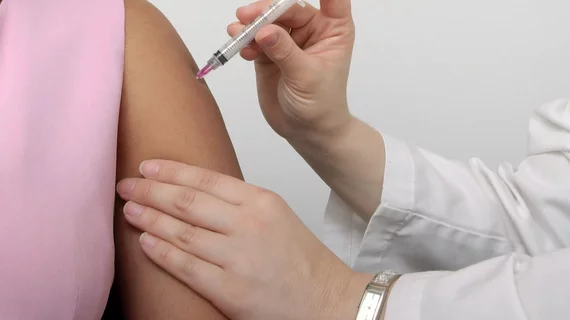Healthcare workers do the courageous thing by going first for a COVID shot
Media outlets en masse captured the scenes this week when the first round of U.S. residents got inoculated with a COVID-19 vaccine.
As frontline healthcare workers went to the literal front of the line to receive Pfizer’s first-out preparation, The Wall Street Journal went to press with a story capturing the tenor of the moment at a handful of hospitals.
- Chicago Mayor Lori Lightfoot was on hand to applaud the initial recipients at 122-bed Loretto Hospital, which serves a largely African-American community in which COVID has done much harm. “I got goosebumps watching this happen,” Lightfoot said later at a press conference, according to the WSJ.
- At a vaccine clinic operated by Rutgers-affiliated University Hospital, an ER nurse named Maritza Beniquez led the charge to the COVID immunization station. “I won’t have to be afraid to go into a room anymore,” Beniquez told the press afterward. “I won’t have to be afraid to perform chest compressions or to be present when they are intubating a patient and giving a breathing treatment that is necessary.”
- In New Hampshire, WSJ recorded the vaccine’s rollout, the first shot of which went to an intensive care nurse at 300-bed Elliott Hospital in Manchester. The nurse, Heidi Kukla, told the newspaper she volunteered to step up and be spotlighted out of a desire to lead by example. Many people are “worried about how fast [the vaccine] was produced, what the long-term effects may be,” she explained. “But I can assure you that there is absolutely nothing worse than being a patient on a ventilator in an ICU anywhere in this country right now, with COVID, and the anguish of the family members that can’t be there.”
The WSJ report also looks at the proceedings in Minneapolis, Los Angeles and San Francisco, noting that Moderna’s entry in the COVID vaccine race could be authorized by the FDA this week and shipped by the weekend.
The article also balances the idealism of the momentous coast-to-coast vaccine rollout with a cold splash of reality.
“With limited supplies, hospitals are having to devise rationing methods, navigating ethical, legal and practical challenges of coordinating a mass vaccination campaign among employees as shots become available,” WSJ reports.
“Federal officials expect about 100 million Americans to be immunized against Covid-19 by February or March,” WSJ points out. “The general public could be inoculated in the spring or summer.”
Whole thing here.

